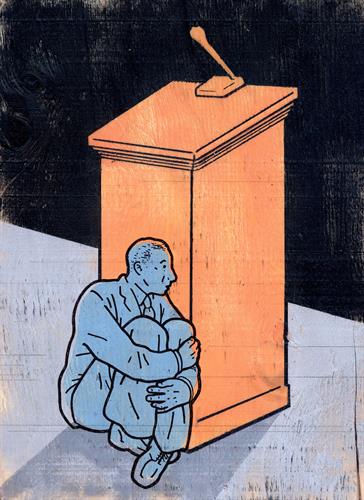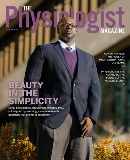Do I Belong Here?
How to overcome imposter syndrome, a common mental roadblock.
By Candace Y.A. Montague

Ninette Shenouda, PhD, had some awkward moments during her time in graduate school. She quietly examined the achievements of her fellow classmates and had a feeling that she just didn’t belong.
“It started as soon as I got to grad school,” she says. “All of a sudden, you’re in an environment with all these very intelligent people, mentors and colleagues. And there were several different factors that gave me the feeling that somehow I snuck through the cracks. Like somehow they must have made a mistake letting me in.”
But there was no mistake. Shenouda, now a postdoctoral researcher in the Vascular Physiology Laboratory at the University of Delaware, was experiencing imposter syndrome.
According to Harvard Business Review, “Imposter syndrome can be defined as a collection of feelings of inadequacy that persist despite evident success. ‘Imposters’ suffer from chronic self-doubt and a sense of intellectual fraudulence that override any feelings of success or external proof of their competence. They seem unable to internalize their accomplishments, however successful they are in their field. High-achieving, highly successful people often suffer, so imposter syndrome doesn’t equate with low self-esteem or a lack of self-confidence. In fact, some researchers have linked it with perfectionism, especially in women and among academics.”
In science, imposter syndrome can grow swiftly due to the competitive nature of the field. People who experience imposter syndrome tend to overlook their achievements and undermine their qualifications and thus pass up opportunities for career advancement.
It’s rare for people to reveal that they feel out of place, but imposter syndrome has affected some of the most successful people, including scientists, from time to time. The syndrome was first dubbed “imposter phenomenon” by two clinical psychologists, Pauline Rose Clance, PhD, and Suzanne Imes, PhD, when they explored it in 1978 at Georgia State University during a study of high-achieving women.
Recent studies have estimated that at least 20% of college students and approximately 70% of the U.S. population wrestle with this syndrome. It robs talented, qualified people of the chance to not only explore new opportunities but also the chance to relish in their own success. So, how can highly qualified people defeat this problem and advance in their careers? We tapped a few experts to break down how this issue holds back so many people—including many in scientific careers—and what steps can be taken to keep it from interfering with growth.
‘IT THRIVES IN SILENCE’
Imposter syndrome can erode confidence and cause people to shy away from golden opportunities that they are more than suited to get. It happened to Gia Storms, founder and executive coach in leadership development at Storms Coaching and Consulting in Los Angeles. Storms found those inner voices chipping away at her when she changed career paths.
“When I left the corporate space to start my own business, there was a lot of critic activity and imposter syndrome that told me I had no business being a coach,” she says. “I had no business being out there on my own or charging certain fees for my work. And, of course, I knew at the time that it was a signal that I was moving bravely beyond the realm of the known. It thrives in silence. Like most shame-based behaviors, imposter syndrome thrives when you don’t speak it out loud.”
Shenouda says that much of the syndrome comes from comparison. “A lot of it is a comparison game. In science you’re compared against your colleagues for publications, scholarships and grants. It’s very easy to see someone’s successes, their publications and funding and see your own rejections and struggles and feel like you don’t measure up.”
Hugh Kearns, a researcher at Flinders University in Adelaide, Australia, says science fields are a breeding ground for imposter syndrome. Kearns is also director of ThinkWell, an organization based in Australia that provides coaching for PhD students and professionals.
“In science you’re taught to be a critical thinker,” he says. “What that means is you look for the gaps and flaws. You focus on what is not working, which means you’re very critical about everything, including yourself. So, you turn that back on yourself and you say, ‘I’m not as clever as I should be.’ You’re constantly finding fault. So, in scientists it’s quite common because that’s the way your brain is working.”
Ultimately, Shenouda confronted her feelings and found ways to move beyond this obstacle. “As I progressed through my graduate studies and career, I came to realize that the people I looked up to, whether it was my mentor or colleagues, also had their own struggles and weaknesses,” she says. “Nobody gets to the top in a direct path. And the more I became aware of that, the more I felt at ease with my own struggles.”
THE GENDER DIVIDE
Data on imposter syndrome often point to women experiencing it more often than men. But imposter syndrome is not a construct that affects one gender more than the other, according to a 2021 Harvard Business Review article (see https://hbr.org/2021/02/stop-telling-women-they-have-imposter-syndrome). Behind the scenes, many people suffer from it. The difference is that women talk about their experiences while men largely go silent.
“If you look at the background of impostor syndrome as it’s first described in the ’70s in the U.S., it was really looking at women in academia because that’s where the researchers were looking. But if you look deeper, you’ll see many men were included as well,” Kearns says. “For men, it's not cool to talk about it. You’re supposed to be this confident, successful person. Yet, you feel inadequate in some ways. So, men are more likely to bottle it up.”
Storms confirms that men are often reluctant to share their feelings in competitive spaces. “In my experience working with men, it’s a lot harder for them to share openly about feelings of inadequacy—those feelings being out of their depth. And the way men are socialized, they can be incredibly criticized about feeling vulnerable and admitting they were nervous. So, generally those feelings exist in men; they are just less encouraged to talk about it.”
HOLDING BACK RACIAL MINORITIES
Imposter syndrome’s negative effects can be more pronounced for non-white people, who are already contending with oppression, underrepresentation and being underestimated. In turn, that can affect school admissions, academic performance and recruitment efforts of companies trying to diversify and be more inclusive. In a study conducted at the University of Texas at Austin in 2017, at least 70% of the minority students surveyed experienced imposter syndrome. In addition, imposter syndrome can exasperate preexisting depression and anxiety that some minority students are already dealing with in isolation.
In the workplace, imposter syndrome can be rubberstamped by comments and microaggressions. In a 2019 HuffPost article, Jolie Doggett, a Black journalist, explains that many Black Americans already experience negative thoughts of not belonging in certain workspaces. And then, negative workplace interactions seem to confirm their doubts. “Imposter syndrome isn’t just an imaginary voice in our heads,” Doggett writes. “We can hear it loud and clear when we receive almost daily messages from society that we truly don’t belong.”
GETTING OUT OF YOUR OWN WAY
Imposter syndrome can be defeated so it doesn’t continue to derail a person’s success. Experts agree that talking about imposter syndrome more; finding support through coaches, mentors
and affinity groups; and writing down accomplishments and celebrating successes can help terminate those awkward feelings.
“Role models and mentors are essential,” Storms says. “They can provide a safe space to say out loud, ‘I’m not sure I can do this’ and admit the scary thought. They become your network who can reflect back at you that you can absolutely do this.”
Shenouda credits her “phenomenal” mentor for showing her how to internalize accomplishments. “She found a way to celebrate our achievements. If someone completed their data analysis or data collection or got a scholarship, she would find a way to celebrate in the lab. By celebrating our achievements, she taught me to celebrate the milestones along the way.”
Shenouda also notes that taking time to understand imposter syndrome is a way for leaders and supervisors to show compassion. “When that student or employee comes to you about their feelings, you’re going to be a little more understanding,” she says. “You can at least assure them that this is normal and they shouldn’t let it hinder their career advancement or performance.”
Focusing on the endgame and not the failures and setbacks is crucial for warding off imposter syndrome. It will come back again and again, but as Kearns suggests, don’t let it rule you. “Have a goal; don’t let it hold you back, because that’s the real scary thing about imposter syndrome--it stops people from doing things. If you think you can do it, off you go and do it.”
This article was originally published in the May 2021 issue of The Physiologist Magazine.
“In science you’re taught to be a critical thinker. What that means is you look for the gaps and flaws. You focus on what is not working, which means you’re very critical about everything, including yourself. So, you turn that back on yourself and you say, ‘I’m not as clever as I should be.’ … So, in scientists it’s quite common because that’s the way your brain is working.”
Hugh Kearns
The Physiologist Magazine
Read the Latest Issue
Don’t miss out on the latest topics in science and research.
View the Issue Archive
Catch up on all the issues of The Physiologist Magazine.
Contact Us
For questions, comments or to share your story ideas, email us or call 301.634.7314.


